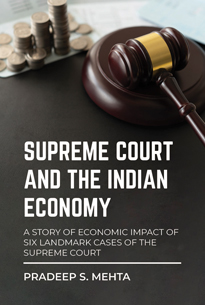 A4
A4

Hard-cover
•
2024
Pages: 392
ISBN: 9789332706187
INR 1495

This book innovatively analyses the impact of key decisions made by the Indian Supreme Court on economic matters. It assesses the direct effects of these rulings on relevant sectors and suggests that the Courts could have achieved comparable outcomes with less cost to both society and the economy. The author proposes that the Courts could have used expert advice to attain more balanced resolutions.
Highlighting a positive stance, the book acknowledges the Supreme Court's forward-looking interpretation of the law. It initiates crucial research, prompting a reevaluation of the judiciary's role and legitimacy within the society. This book serves as a valuable resource for lawyers and academics who have an interest in the field of adjudication on economic matters.
This remarkable work by Pradeep S. Mehta is adorned by no less than three Forewords by eminent people (extracts below), and advance praise blurbs from 46 luminaries (see inside pages).
Excerpts from the Forewords
"Merely making courts and the body politic aware of such issues, educating the citizenry in non-jargon language about the nuts and bolts of such jurisprudence, and simply flagging such issues, irrespective of the merits or otherwise of such writing, constitutes a service to society, to the judiciary and to our body politic… author’s reputation with a Ralph Nader lifetime contribution to such issues— and it makes for compelling reading."
— (Dr) Abhishek Singhvi
Third term senior sitting MP; former Chairman, Parliamentary Standing Committee on Law; eminent jurist; National Spokesperson, Congress Party; former Additional Solicitor General, India and Senior Advocate, Supreme Court of India.
"This book is a timely and topical work on an increasingly relevant area of research and analysis. It will lay the foundation for future discussions on the economic impact of judicial decisions."
— Amitabh Kant
Former Chief Executive Officer, NITI Aayog, New Delhi Currently G20 Sherpa of India
"This book is a path breaking and innovative attempt to evaluate the economic impact of several important decisions of the Indian Supreme Court dealing with economic issues… The line of research initiated by this book is an important one which should be encouraged and developed. It compels us to reconsider the role of judges and courts in our societies and to reflect on the legitimacy of the judicial system."
— Frederic Jenny
Emeritus Professor of Economics and Co-Director,
Centre for Law & Economics, Essec School of Business, Paris Chairman, OECD Committee on Competition Judge, French Supreme Court (2004-2012)
Pradeep S. Mehta is the founder Secretary General of CUTS International, a renowned public policy research, advocacy, and networking NGO established in 1983 in India with centres in Nairobi, Lusaka, Hanoi, Accra, Geneva and Washington DC. He is serving on the WTO DG’s NGO Advisory Board for the third time and the G20/B20’s Council on Africa’s Economic Integration. He has held positions on advisory boards like CII’s International Trade Policy Council and GoI’s Board of Trade. Notably, he has advised the Commerce Ministers of India and Zambia. He is a recipient of the MR Pai Award; the SKOCH Excellence Award; the Scindia School’s Madhav Award as an Old Boy of Eminence; and the Businessworld Social Impact Award for promoting competition and consumer protection globally.
Mehta is a prolific writer, speaker, trainer, and organiser in social science, recognised among India's top 30 columnists. He has authored and edited numerous books and papers on trade, investment, competition, law, and development.